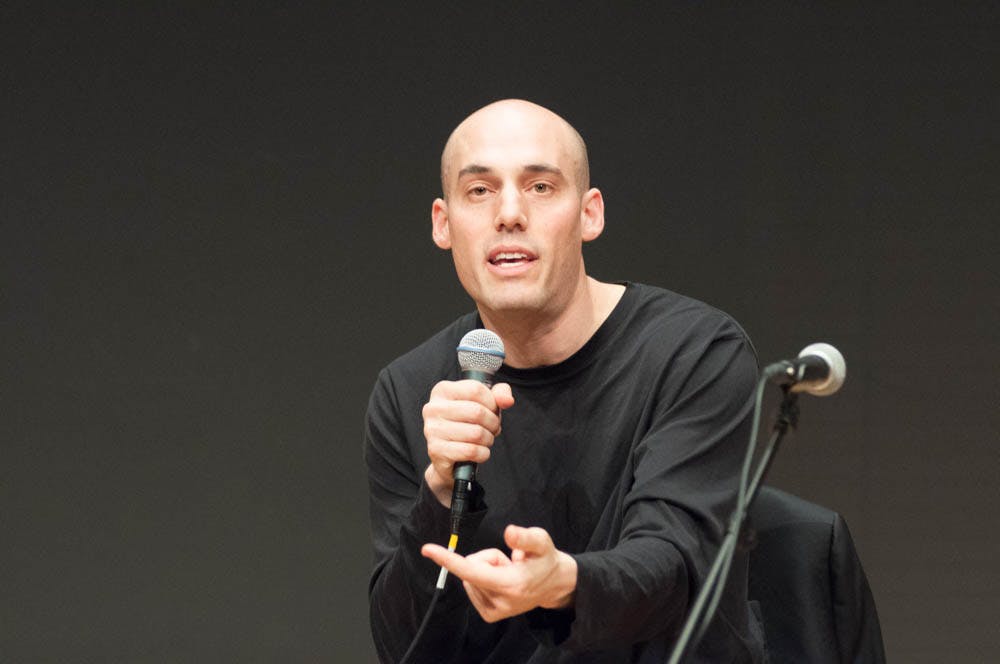Joshua Oppenheimer, director of Academy Award-nominated films “The Act of Killing” and “The Look of Silence,” came to campus Thursday for the screening of his films at the Granoff Center for Creative Arts followed by a panel discussion. Friday he led a graduate master class and a teach-in on Indonesian history and politics.
Both of Oppenheimer’s films are about the legacy of the 1965-1966 genocide in Indonesia. In “The Act of Killing,” Oppenheimer allows perpetrators of mass killings to theatrically stage them. In addition to the re-enactments, the film focuses the killers’ discussions of how they wanted to stage the re-enactments.
In having perpetrators design their own dramatizations, Oppenheimer told The Herald he sought to discover who their “imagined audience” was.
“How do they want the world to see them through my cameras?” he added. “How do they really see themselves?”
Reflecting on developing relationships with mass murderers, Oppenheimer said, “I never found monsters. I always found human beings who — apart from these terrible crimes they committed — could be my grandfather or my uncle.”
“We have to understand how human beings do this,” he added.
“The Look of Silence” follows the brother of a victim of the genocide, who lives surrounded by his brother’s killers.
“I see my films as holding up a mirror in which we confront — all of us, not just Indonesians — some of our most important and painful truths with the hope that we can solve anything so long as we can face it,” Oppenheimer said.
In the Thursday panel — with Bhrigupati Singh, assistant professor of anthropology, and Doreen Lee, associate professor of anthropology at Northeastern — Oppenheimer said that “The Act of Killing” explores the perpetrators’ blindness to the humanity of the people they have killed, which accompanies the narratives they tell.
At the Friday teach-in, Senior Fellow in International and Public Affairs Stephen Kinzer discussed CIA operations in Indonesia leading to up the genocide. Oppenheimer spoke about Indonesian leader Suharto’s rise to power, and Lee discussed student movements that eventually pushed Suharto out of office.
During the teach-in, Kinzer noted that Indonesia’s stature as the fourth-most populous country on Earth is “not really reflected in (Americans’) understanding of the world.” He said that while Indonesia appears to be a democracy, the military continues to constitute “a shadow state that is actually sovereign.” The influence of a similar external force over government may exist in other countries as well, he added, alluding to the United States. “It’s true about Indonesia and may be true about other places,” he said.
Reflecting on the victory of President-Elect Donald Trump, Oppenheimer told The Herald that “we ought to now watch (these films) without being able to reassure ourselves that this is something that we’re in any sense above.” The fact that Trump was able to win “is an inevitability in a society built on so much cruelty, which it has not had the moral courage to look at,” he added.
“White backlash is the backlash of something monstrous but very human and very fearful,” Oppenheimer said. White backlash is “very human in their fear of actually looking at what whiteness is … an identity that defined itself only through exclusion and herding and enslaving of others.”
He also noted that “You could make almost the same film” as “The Act of Killing” “with Donald Trump, not because he’s a mass murderer but because: Who is he? What facade — what mask — is he wearing at any given moment?”
Reflecting on both the Indonesian genocide and Trump’s election, Oppenheimer said, “We can struggle for a society that teaches kids to question authority rather than to honor it and obey it; to certainly question the so-called virtue of patriotism and instead to recognize the truth, … that patriotism is the virtue of the vicious and to practice the wider empathy that’s possible when you start to recognize that the world isn’t divided into us and them — good guys and bad guys, white and black.”
“I think if we built a society based on those principles, this kind of horrific violence could actually become impossible,” Oppenheimer said. “We have it in our humanity to be good to each other and love each other, but not when we define ourselves and find worth and importance through hurting one another.”





